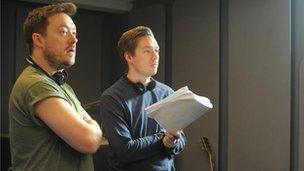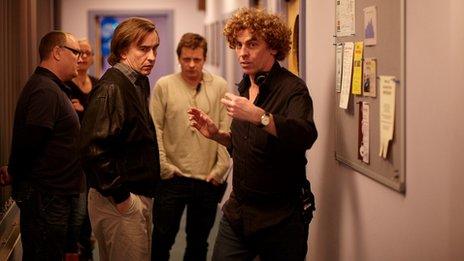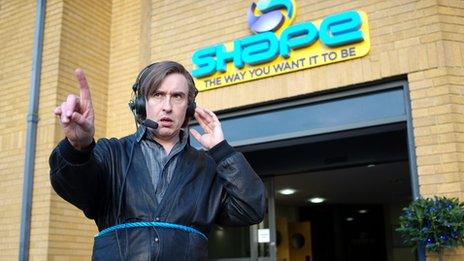The gamble of bringing Alan Partridge to the big screen
- Published

Alpha Papa sees the DJ attempt to become a hero as a siege negotiator
As the much-loved comedy creation Alan Partridge finally makes it onto the big screen, Steve Coogan and the team behind it tell the BBC how it only happened after "many rows", "jumping through hoops" and almost another film's worth of material ending up on the cutting room floor.
"It's quite peculiar really. It's like I did a funny voice and I've woken up 20 years later living in this alternative universe."
Steve Coogan is pondering how his iconic comedy creation went from a sports reporter on Radio 4's On the Hour to his current big screen incarnation.
"Did I think 20 years later I'd still be doing him? No - I might have been very depressed if you'd told me that at the time," he admits laughing.
As it turns out Coogan has found he gets a "thrill" going back to his most famous role over the years, as long as he has spent time doing more serious work.
"I was the one banging on Armando [Iannucci's] door saying when are we going to do an Alan Partridge film," he admits.

Neil and Rob Gibbons were on set every day to collaborate with Steve Coogan on rewrites
Iannucci helped Coogan create Partridge along with Peter Baynham all those years ago.
But with both of them busy with careers in the US, twin brother comedy writers Neil and Rob Gibbons joined the writing team.
"Steve and Armando said to us 'we're bringing Alan to the big screen and we don't know if it's going to work so we'd like a couple of scapegoats' and we said we'd be delighted," explains Rob.
The brothers earned Coogan's admiration working on the online Partridge show, Mid Morning Matters, and the Partridge autobiography.
The writing process for the film involved the Gibbon brothers and Coogan "sat round a table all doing Partridge voices to each other".
Although Neil says sometimes the lines between Partridge and Coogan did become blurred.
"Steve sometimes doesn't really do the voice and he'll be improvising and coming out with stuff and then he'll say 'I saw a great episode of Air Crash Investigation last night' and you'll think 'oh that's good' and start to write it down. And he'll be like 'no I really did watch a great episode'. He very much blurs the line."
Each day on set they would have a writing session in the morning where they often "just ripped stuff up" - even between takes.
"There were a lot of rows, but they were healthy rows that come from a place of love," admits Neil.

Declan Lowney directs Steve Coogan on the radio station set, which was in London - they moved to Norfolk for the final two weeks of filming
"There were a lot of opinions and a lot of disagreements but they're a very intelligent bunch of people who are all able to express themselves terribly well when they need to," explains director Declan Lowney.
The Father Ted director was brought on board after "jumping through Armando's hoops", as he puts it.
"They were just very careful about who they share the collaborative process with, to protect the purity of Partridge," he explains.
He admits he found the expectations of fans daunting and the collaborative way of working "fascinating, frustrating and very time-consuming".
"But the results speak for themselves and that's all that matters at the end of the day," he says.
"No one cares how long that took and you did 20 other scenes before that and threw them away."
In the end an hour and 20 minutes worth of material ended up on the cutting room floor for not being funny enough.
The other major consideration in his big screen metamorphosis was what to do with Alan.
"You have to satisfy the purists and keep it broad enough to make it accessible to a wider audience - being both myopic and parochial and making it dynamic and cinematic," says Coogan.
"You go too much one way or the other and you use the plot. If you make it too big you lose the DNA of the character."
So Partridge going to Hollywood was out of the question.

North Norfolk Digital becomes Shape after being taken over
Instead the DJ remains in his home town of Norwich, where his radio station is taken over by a media conglomerate and becomes the centre of an armed siege by a disgruntled DJ.
"Originally it involved al-Qaeda and BBC Television Centre, which was perhaps too risky," admits Coogan. "So we backed off from that - it was too big, too larger than life.
"You can do action but not slick and polished. [It needs to be] awkward and clumsy which was consistent with Alan's world."
One final step was to ditch the ageing make up. However, it helped the actor himself is growing closer in age to his comic alter-ego.
"When you look at him on TV he can look a little bit caricatured in retrospect - when you put him in a film, you want the audience to at least believe that it's real," he says.
With fanatical fans, taking Alan Partridge on to the big screen was a big gamble. Many TV creations don't make the leap but it seems like all the rows and attention to detail have paid off.
The film has gained many four- and five-star reviews, with The Guardian calling it an "a quietly audacious triumph", external and Variety saying Partridge makes an "effortless transition", external to the big screen.
As for the future, Coogan believes Alan could "stand another incarnation" but he needs to walk away and do other work.
"What will happen is I will get an Alan itch - and I'm very far away from that at the moment."
Alan Partridge: Alpha Papa is out in the UK and Ireland on 7 August.
- Published28 July 2013
- Published24 July 2013
- Published22 July 2013
- Published16 April 2013
- Published28 February 2013
- Published23 February 2013